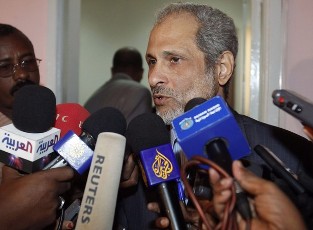Sudan reaffirms its rejection to Darfur rebels’ demands on power sharing
January 25, 2011 (KHARTOUM) — Presidential Adviser Ghazi Salah Al-Deen today reiterated Sudanese government refusal to give a position of vice-president to Darfur, or to establish a regional authority as demanded by the rebel groups.

The two demands are inspired from the concessions made by the National Congress Party to the former rebel SPLM in a peace agreement to end the civil war in South Sudan. The South got a post of vice president and a third level of power was created allowing South Sudan government to administrate the 10 states of the region.
On 30 December, the mediation proposed to the two parties to establish a regional authority headed by a vice-president from Darfur. But Khartoum rejected it in the same day as it had announced the withdrawal of its negotiating team from Doha.
Ghazi who is entrusted with Darfur file said today the dedication of a vice-president post on regional criteria transgresses the equality in constitutional rights between all the regions in Sudan.
“The fundamental position of the government is upholding full equality in the constitutional rights for all citizens and all states, which means not creating special status for any state, party or group,” Ghazi wrote in a statement put public in Khartoum.
The Sudanese official was reacting to statements attributed to the Qatari state minister in Cairo on Sunday 23 January saying Khartoum accepted the proposal of the mediation to give Darfur a vice-president.
However, Ghazi went to say that the any citizen from Darfur region can be president of the republic and any president can appoint a vice-president from Darfur or any other region.
The presidential adviser also warned that a special treatment for Darfur will lay the foundation “for other disagreements and wars more ferocious than ever” alluding to the possible demands from other regions.
Amin Hassan Omer, government’s top negotiator was in Doha recently to discuss with the mediators possible compromise to break the deadlock as the rebel LJM was quick to accept the proposal of the mediation.
On the other pending issue related to the regional authority, Ghazi also rejected the establishment of regional authority adding that the Darfurians would get the opportunity to vote in a referendum to determine the status of the region by the end of the transitional period.
Although he said that the government’s position is to strengthen the existing federal system, and they are resolved to put off claims for regional discrimination in the country.
The rebel groups, JEM and SLM-AW, refused to sign Abuja peace agreement in 2006 because Khartoum refused to concede to the two demands.
For the rebels groups, the issue of the regional authority would allow Darfurians to protect their rights in the land and prevent the repetition of Khartoum policy in this regard.
They balm the ruling National Congress Party of supporting land grabbing by Arab nomad tribes and the killing of local farmers.
The rebels further stress that the development of the region can be ensured by the regional authority as the central governments including the NCP neglected Darfur.
(ST)

Paul Ongee
Sudan reaffirms its rejection to Darfur rebels’ demands on power sharing
Whether Khartoum likes it or not, Sudan is already in the process of steady irreversible disintegration. Khartoum cannot blame SPLM for demanding the position of Vice-Presidency which was given without granting effective participation in decision-making in the nation’s capital here. Decision-making in Khartoum here is certainly handled with discretion.
We were not worried about that since Khartoum’s record of intransigence is widely known. Referendum on self-determination was the centerpiece of the CPA not the cosmetic vice-presidency without power of decision-making in implementing key CPA protocols, reviewing national and foreign policy.
Darfur rebels only need to get united once for all and continue rallying international support to fight for their freedom and God’s given rights to live peacefully without being considered as a domain of Khartoum any more. Khartoum believes that it made a mistake of signing the CPA with SPLM which granted considerable amount of security, power and wealth sharing arrangements.
NCP believes that denying such similar demands to Darfur rebels would help keep Northern Sudan peaceful since domestication of solution and military pressure are still the order of the day. Like previous regimes, NCP does not have any vision for inclusiveness, economic development in the East, West or far North. Regardless of religious belief, Khartoum is not interested in areas inhabited by black Africans in the same land of the black that it ruled for over fifty years now.
However, protracted struggle based on unified military or diplomatic fronts is the only way to get Khartoum accept political demands but not short-sighted vision which will bring regret later.
Paul Ongee
Khartoum, Sudan